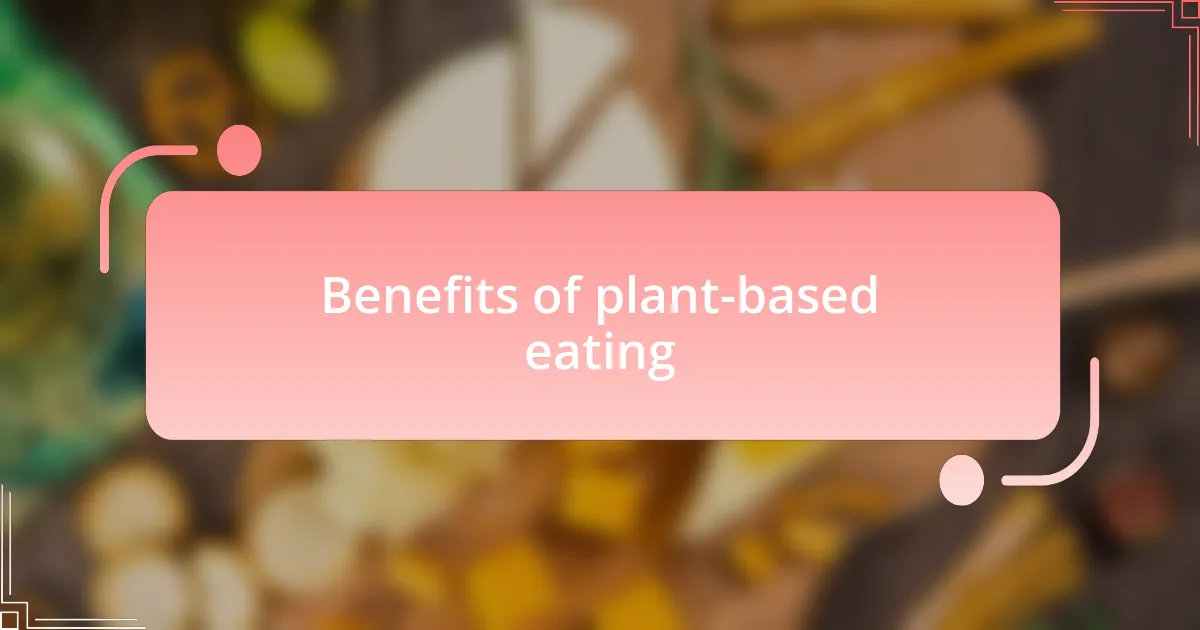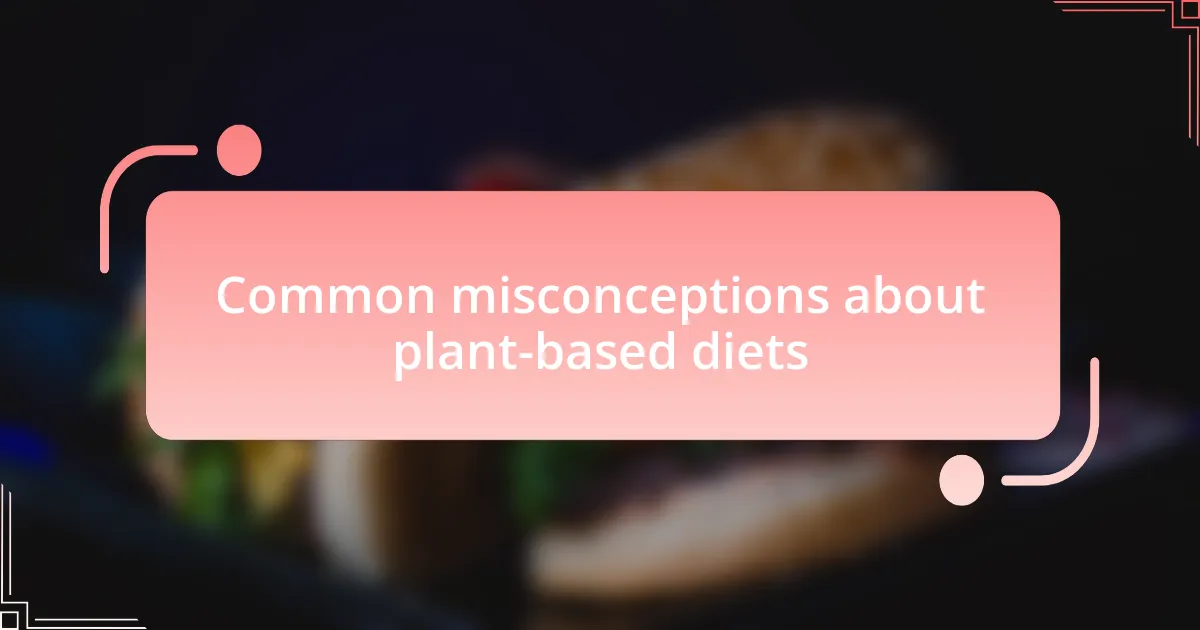Key takeaways:
- A plant-based diet focuses on foods derived from plants, allowing some animal products, and emphasizes health benefits, including improved energy and mental clarity.
- Common misconceptions include beliefs that plant-based diets lack protein and flavor, while many delicious, creative alternatives and protein-rich sources exist.
- Transitioning to a plant-based diet can be made easier by gradually swapping meals, planning ahead, and exploring new recipes and ingredients.
- Simple recipes like chickpea salad, vegetable curry, and vegan chili demonstrate that plant-based meals can be satisfying, flavorful, and enjoyable to prepare.

What is a plant-based diet
A plant-based diet primarily focuses on foods derived from plants. This includes fruits, vegetables, nuts, seeds, oils, whole grains, legumes, and beans. I remember the first time I tried switching to more plant-based meals; not only did I feel lighter and more energized, but I also began to appreciate the vibrant flavors and textures that nature offers.
Unlike a vegetarian or vegan diet, a plant-based diet doesn’t necessarily eliminate all animal products. Some people might still include dairy or eggs, but the cornerstone is definitely plant foods. Reflecting on my own experience, incorporating more plant-based meals gradually transformed my approach to food, making me more aware of where ingredients come from and how they impact the environment.
I’ve often wondered how many people miss out on the benefits of a plant-based lifestyle simply because they associate it with restrictions. The truth is, embracing a plant-based diet has opened my eyes to new culinary delights, enabling me to experiment with creative recipes and seasonal produce. It’s an exciting journey that can lead to improved health and a greater connection to the food we eat.

Benefits of plant-based eating
Adopting a plant-based diet can significantly improve your health, as many studies suggest that it lowers the risk of chronic diseases. For instance, when I switched to more plant-based meals, I noticed an astounding decrease in my energy levels throughout the day. It felt like my body was finally responding positively to the nutrients packed in fruits and vegetables, allowing me to engage in my daily activities with increased vigor.
What struck me most was how incorporating more plant-based foods directly influenced my mood and mental clarity. I remember a particularly stressful week when I decided to load up on leafy greens and legumes. To my surprise, my anxiety levels noticeably decreased, and my focus sharpened. Could it be that the right foods truly have the power to uplift our spirits and enhance our mental well-being?
Furthermore, I’ve found that embracing plant-based eating can lead to sustainability and environmental benefits. Each meal filled with plants can be a small yet impactful action towards reducing carbon footprints. Reflecting on my own kitchen experiments, I often think about how amazing it is to contribute to a healthier planet simply by choosing vibrant, plant-rich meals over processed options. Isn’t it fascinating how our food choices can create ripples of change beyond just our personal health?

Common misconceptions about plant-based diets
One of the most common misconceptions I hear about plant-based diets is that they lack sufficient protein. I’ve encountered this argument countless times, often sparking conversations where I share my experiences with protein-rich plant sources. For instance, when I embraced legumes, tofu, and quinoa, I realized that reaching my protein goals became not only achievable but enjoyable as well. It’s important to recognize that plant-based diets can provide ample protein, and many athletes are proving this with their performance.
Another myth is that switching to a plant-based diet means saying goodbye to all my favorite foods. I used to believe that I’d miss out on the comfort of a hearty meal. However, I discovered an exciting world of plant-based alternatives, from rich cashew cream to savory mushroom burgers. When a friend introduced me to a plant-based version of my beloved spaghetti carbonara, I was taken aback by how satisfying it was. So, why should we limit ourselves when there are endless creative possibilities?
Lastly, many people think that a plant-based diet is bland and unexciting. I can relate to the fear of missing out on vibrant flavors. Yet, I’ve found that spices and herbs can breathe life into plant dishes in ways I never imagined. For instance, a simple bowl of roasted vegetables becomes a culinary adventure with the right blend of herbs and spices. Isn’t it remarkable how embracing new flavors can transform our meals and challenge our taste buds?

Practical tips for transitioning
Transitioning to a plant-based diet can feel overwhelming, but I found that starting slow made all the difference. Instead of eliminating everything at once, I replaced one animal-based meal each week with a plant-based option. I started with breakfast, swapping eggs for a delicious smoothie packed with spinach, bananas, and almond milk. It felt rewarding to discover how satisfying a simple change could be.
I also discovered that planning meals ahead is crucial. A week of meal prep not only saved me time but also encouraged new culinary experiments. I remember the first time I made a huge batch of lentil soup and portioned it out for the week – it was comforting to know I had healthy meals ready to go. This approach eased my worries about what to eat and helped me create a diverse menu that kept my taste buds excited.
Don’t shy away from exploring new recipes and ingredients. I recall the thrill of shopping at a local international market, where I stumbled upon jackfruit, a fantastic alternative for pulled “pork.” Trying new dishes can be liberating and fun, almost like a culinary adventure! Have you ever found something unexpected that became a new favorite? I know I have, and it reminded me that transitioning isn’t just about change; it’s about exploration.

Recipes for plant-based meals
When it comes to plant-based meals, I’ve had some delightful experiences experimenting with recipes. One of my favorites is a chickpea salad stuffed in ripe avocados. The creamy texture of the avocado combined with the protein-packed chickpeas creates a satisfying dish that not only fills me up but also feels indulgent. It’s a quick meal that I often whip up on busy days, yet it always feels special. Have you tried using avocados in unique ways?
I also love making a hearty vegetable curry that warms both the stomach and the soul. By sautéing fresh veggies like bell peppers, zucchini, and spinach with fragrant spices, I create a vibrant dish bursting with flavor. The secret? A splash of coconut milk adds a creamy richness that keeps me coming back for seconds. Remember that feeling when you take that first bite of something you’ve created? It’s pure joy, isn’t it?
One recipe that never fails to impress is a vegan chili made with black beans, corn, and a blend of spices. I recall the first time I served it at a gathering with friends. The pot disappeared in no time, and I felt a wave of pride from introducing them to something plant-based that was so satisfying. It’s a reminder that plant-based meals can be hearty and comforting. What’s a dish you’ve made that surprised your friends with its richness?